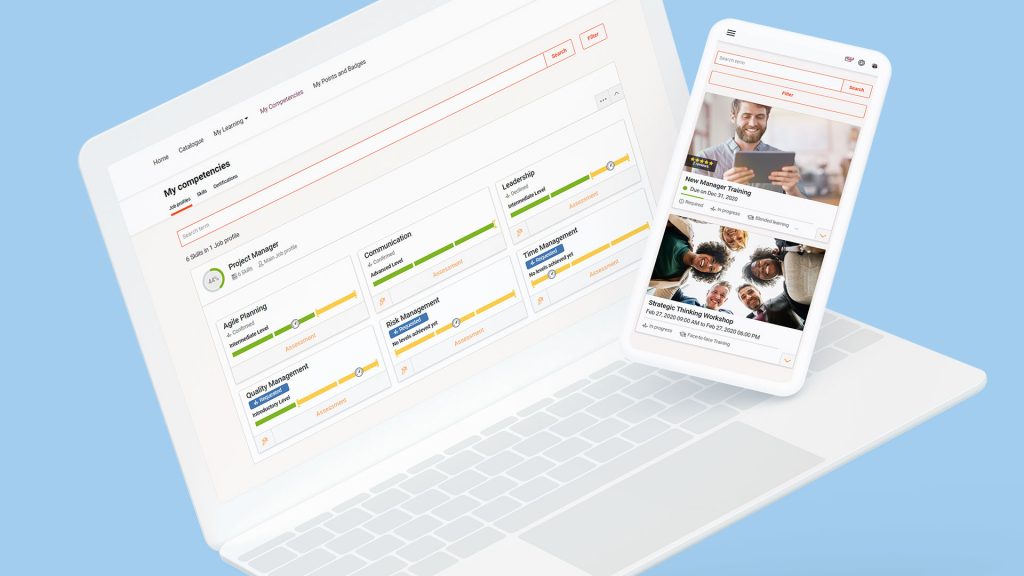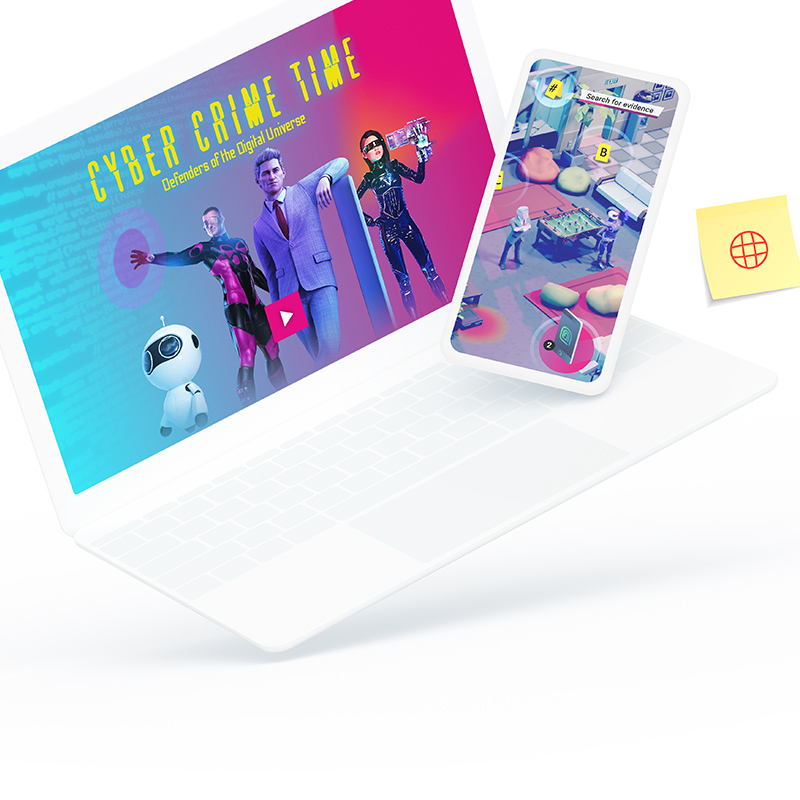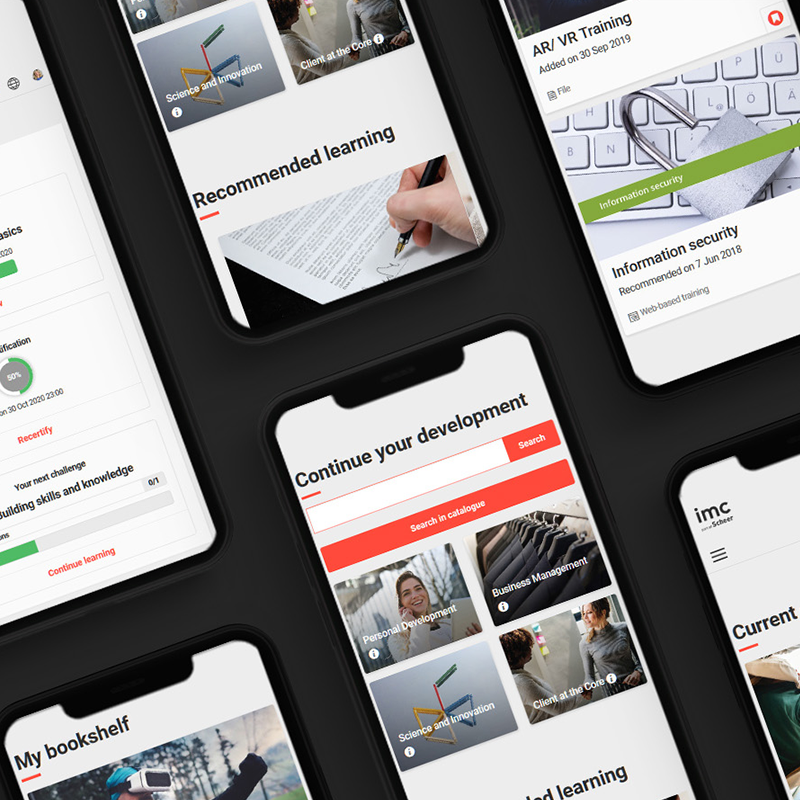About imc
With more than 25 years’ experience, 12 international locations and 400 employees, imc is the leading full-service provider for digital training. Experts in strategy, technology, and e-learning content work hand in hand to offer holistic and tailored e-learning solutions – worldwide.
Founded as a German university spin-off at Saarland University, we provide holistic support to more than 1,300 companies, public and educational institutions from all sectors and of all sizes in the planning and implementation of digital training strategies. More than ten million users around the world successfully master their individual professional challenges everyday thanks to our solutions.
Our award-winning product portfolio comprises learning management, performance support and authoring solutions. In addition, we offer conceptual design and tailored learning content creation in our E-learning Content division. An extensive library of immediately available standard learning content completes our portfolio. Besides, our Learning Strategy Consultants integrate all elements of e-learning with each other and align it with your business strategy. For maximum effectiveness.


Role in the project
imc takes over the consortium leadership of the MERLOT project as well as the leadership of the requirements analysis activities. The goal of these activities is to ensure the technical and legal compliance of the MERLOT marketplace with the Gaia-X framework as well as to enable the implementation of data-driven business models of the users.
As a technology partner, imc focuses on the conception of the functionalities for self-sovereign data exchange as well as on the implementation of the interfaces. One of imc’s core tasks is to develop a template for MERLOT-compliant Smart Education Services based on GXFS, which can be reused by other providers.
imc contributes to the development of the MERLOT marketplace and the connection of (advanced) Smart Education Services and participates in the piloting of the overall solution.
Planned results
imc’s goal in the MERLOT project is to adapt its existing services (mainly learning and skills management services) to become part of the Gaia-X-based education ecosystem. In doing so, imc focuses on the aspects of data sovereignty and interoperability of digital education services as well as on the provision of a marketplace for these services. The main planned outcomes are:
- A Gaia-X compliant Smart Education Service Template
- An operational infrastructure for Smart Education Services
- Gaia-X compliant and interoperable data space and business model prototypes for Smart Education Services
- Interoperability between Smart Education Services and AI-based Advanced Smart Education Services as well as the demonstration of added values from the latter
- The operation and sustainable operational concept of the MERLOT marketplace

Reference projects in related areas
The goal of the POSSIBLE project is to simplify communication between government, commercial and private users via interfaces. The consortium is developing a user-friendly cloud solution that will enable government agencies, educational institutions and SMEs to select and combine certain coordinated services from a comprehensive catalogue while at the same time ensuring that the data is always handled in a transparent, trustworthy, secure and fair manner.
imc’s focus here is on developing analysis and recommendation services that integrate educational and administrative dataspaces in a way that is Gaia-X compliant, thereby enabling value-added services for administrative employees on several levels.
Two reference scenarios are being developed for this. The first scenario links process, learning and competency data to give employees tailored and appropriate recommendations from among available professional development or skills development options.
In the second scenario, the objective is to combine and integrate administrative process data with existing competency and learning data, to present it and make it evaluable. The result will be improved support for HR managers in managing and identifying skills development needs and planning professional development measures.
The L3OOP – “LifeLongLearning Open Operating Platform” project, which was carried out from September 2021 to February 2022 as part of the BMBF funding call “Initiative National Education Platform – Goal 3”, focused on (1) developing a vision for Germany’s future National Education Platform (NBP), (2) implementing a proof-of-concept (PoC) implementation demonstrating the core functionalities of the NBP, and (3) developing an operating concept for the NBP.
The training and professional development of physiotherapists and physicians is the clear focus of the collaborative SmartHands project: A learning platform for digital media in manual medicine and therapy based on smart devices.
Manual therapy practitioners rely on their hands. They need to palpate the patient’s body to reduce pain, increase mobility or avoid operation. SmartHands now offers an opportunity to train these skills and gain the necessary hands-on experience without the risk of a wrong move or misdiagnosis impacting the subject.
The project aims to develop virtual training applications that physicians and physiotherapists who are training to become manual medicine practitioners can use to practice diagnostic steps or specific techniques without involving real patients. The training applications can be used to simulate the learner’s sensomotoric-haptic and visual interactions.
Thus far, training has focused on a theoretical understanding of real medical cases with techniques being practiced on dummies or simulation patients. This does not reflect the reality of the job, and only conveys part of the necessary practical skills.
imc supports the technical realization of this project and provides the imc Learning Suite as a teaching and learning platform that allows trainers to prepare virtual training units and offer learners a blended learning scenario.
https://www.a-digikomp.rwth-aachen.de/en/
The joint project A-DigiKomp focuses on the promotion of digital competencies and sovereignty of adolescents through Games and Dialog Systems.
In this project, imc is responsible for the implementation of the Dialog System in the form of a Browser Plugin, which serves to gradually strengthen and promote the competencies of adolescents in various subject areas such as data protection law, criminal law, copyright, information security.
In this project imc uses the Learning Management System as a cloud platform for human-technology dialogs which support learning. The serious game developed by project partners accesses this platform to record and update the game level and learning success of users.
Resulting user competency profiles help the Digital Competency Assistant – the Browser Plugin that suggests personalized game/learning options for users based on their competency.
This way of promoting the digital competence and sovereignty of adolescents will be tested with the target groups within the project and its effects on competence development and behavior of the young adults will be scientifically evaluated.
To learn more about this exciting project, we recommend visiting the project website.
Browse the overview of selected ongoing and concluded research projects here:
https://www.im-c.com/learning-technologies/research-innovation-labs/projects/
Information
Sector:
Products / Services:
Contact:
Email: sabine.zander(at)im-c.de
imc information multimedia communication AG
Scheer Tower, Uni Campus Nord
66123 Saarbrücken / Germany

